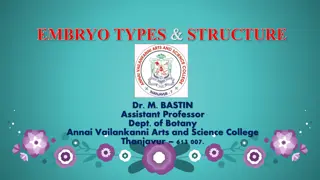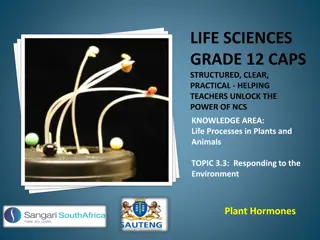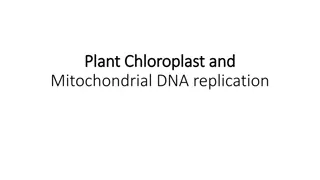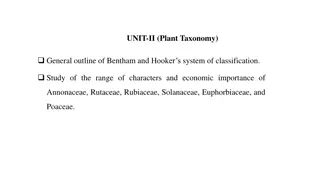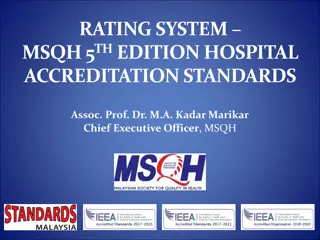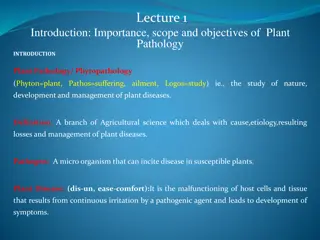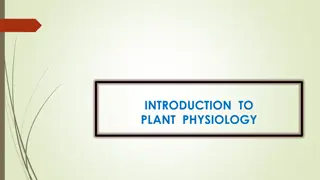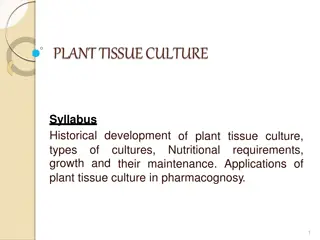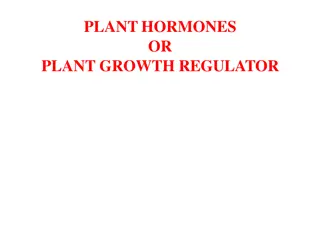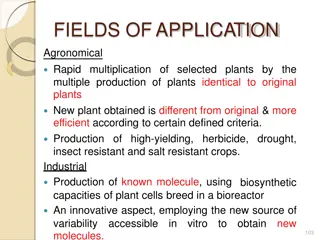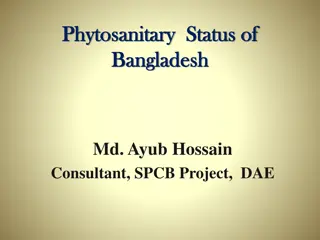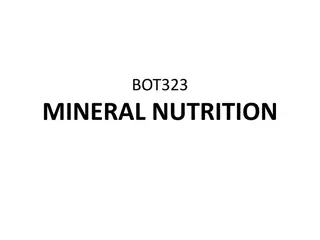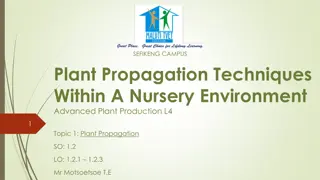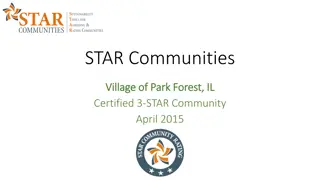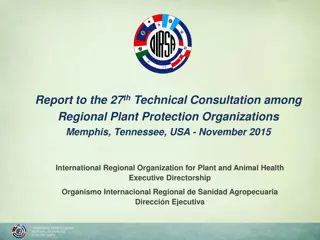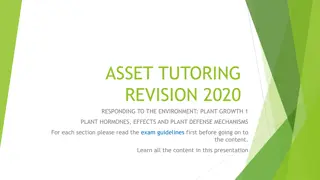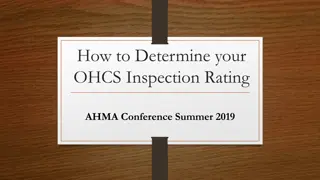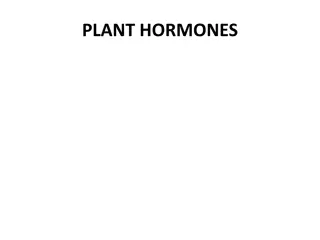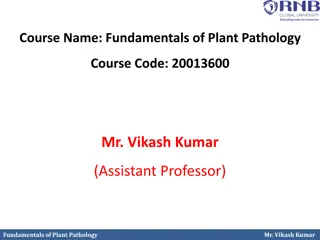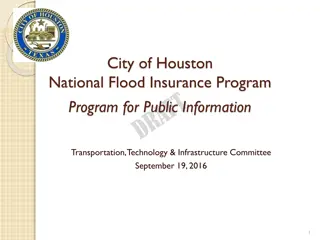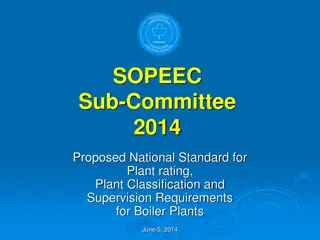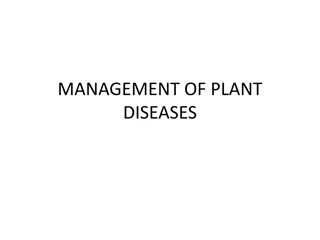Unit 1: Introduction and History of plant pathology
The science of plant pathology, which studies plant diseases and aims to protect the food supply by improving plant survival in unfavorable conditions. Explore the causes of plant diseases, their symptoms, and methods of prevention and control.
5 views • 13 slides
Amway Nutrilite All Plant Protein Powder 1kg Deutsche Post AG
Amway Nutrilite All Plant Protein Powder is a premium source of protein derived from plant-based ingredients. With each serving, you get a blend of high-quality protein to support your active lifestyle and dietary needs.\nAmway Nutrilite All Plant Protein Powder offers a convenient way to supplement
1 views • 4 slides
Volkswagen Group Supply Platform Sustainability Rating Acquisition Guide
Step-by-step guide on obtaining your Sustainability Rating through Volkswagen Group Supply Platform. Learn how to acquire a DUNS number and register on OneKBP for the rating process. Detailed instructions and images included.
2 views • 36 slides
Overview of 38 CFR Part 4 Rating Schedule
This class provides a general overview of 38 CFR Part 4, covering essential aspects such as evaluative rating, resolution of reasonable doubt, evaluation of evidence, and principles for assigning disability ratings. It emphasizes the importance of accurate medical exams and understanding rating perc
0 views • 84 slides
Understanding Plant Embryogenesis: A Comprehensive Overview
Plant embryogenesis is a crucial process in the development of plant embryos from fertilized ovules, involving cell division, differentiation, and morphogenesis. This process leads to the formation of seeds, which play a vital role in the plant life cycle. The stages of embryo formation, structure,
1 views • 25 slides
Understanding Plant Tissue Culture: Methods and Requirements
Plant tissue culture involves the in-vitro culture of plant explants under aseptic conditions, covering cell, organ, and suspension cultures. This process, pioneered by German botanist Gottlieb Haberlandt, relies on the totipotency of plant cells. Key requirements include laboratory organization, su
0 views • 18 slides
Understanding Plant Hormones and Their Functions in Plants
Plant hormones play crucial roles in various plant processes such as growth, development, and response to environmental stimuli. Auxins, gibberellins, and abscisic acid are key plant hormones that regulate tropisms, cell division, elongation, flowering, seed germination, and dormancy. Understanding
1 views • 50 slides
Plant Mitochondrial and Chloroplast DNA Replication Mechanisms
Plant mitochondria and chloroplasts have intricate DNA replication processes. Mitochondrial DNA replication is independent of the plant cell cycle and is associated with specific proteins in nucleoid complexes. Plant mtDNA contains more genes than animal mtDNA, with a complex structure involving int
1 views • 16 slides
Overview of Bentham and Hooker's Classification System in Plant Taxonomy
Bentham and Hooker's system of classification in plant taxonomy, outlined in Genera Plantarum, provided detailed descriptions of families and genera based on original plant dissections. This classification system has practical value for plant identification, with keys for taxa and subdivisions for l
3 views • 47 slides
Understanding Plant Tissue Culture Media and Their Importance in In Vitro Growth
Plant tissue culture media play a crucial role in the in vitro growth and morphogenesis of plant tissues. The composition of culture media depends on the specific plant species and the type of material used for culture. Various types of media, such as White's medium, MS medium, B5 medium, N6 medium,
0 views • 6 slides
Changes in FIDE Rating Regulations from 1 January 2022
The FIDE Rating Regulations underwent significant changes effective 1 January 2022. These changes include adjustments to the minimum time controls required for players based on their ratings, modifications to the intermediate time control rules, updates to monthly reporting guidelines for tournament
0 views • 11 slides
MSQH 5th Edition Hospital Accreditation Standards Rating System
MSQH (Malaysian Society for Quality in Health) 5th Edition Hospital Accreditation Standards introduce a comprehensive rating system to assess compliance levels in healthcare service standards. Ratings range from 1 to 4, reflecting poor to excellent achievements based on evidence of compliance with e
0 views • 22 slides
NFRC Daylighting Potential Task Group Report 2018
The NFRC Daylighting Potential Task Group is focused on developing a new, simplified product rating for residential customers to assess the daylighting impact of fenestration products. The group aims to establish a standardized value that expresses the overall daylighting impact on interior spaces,
6 views • 8 slides
Understanding Plant Pathology: Importance, Scope, and Objectives
Plant pathology, also known as phytopathology, is the study of plant diseases and their management. It covers the causes, symptoms, and impact of pathogenic organisms on plants. The field aims to understand the interactions between plants and pathogens, develop control methods, and reduce losses in
0 views • 6 slides
Introduction to Plant Physiology: Exploring the Functioning of Plants
Plant physiology is a crucial subdiscipline of botany that delves into the processes and functions operating within plants. This field closely examines areas like plant morphology, ecology, cell biology, and genetics, shedding light on vital processes such as photosynthesis, respiration, and more. T
1 views • 7 slides
European Standards for Plant Biostimulants Development
The European Committee for Standardization (CEN) plays a crucial role in developing European standards for plant biostimulants, focusing on improving plant nutrition processes independently of nutrient content. The CEN/TC.455 committee is responsible for creating standards supporting the EU Fertilis
2 views • 5 slides
Guide to Grading and Rating Process for Chess Tournaments
Learn the step-by-step process of submitting tournament results for grading and rating, including generating FIDE-rating and ECF-grading files. Understand the importance of FIDE IDs, updating player information, and handling new players without FIDE IDs. Follow clear instructions on generating and h
1 views • 8 slides
Understanding Plant Tissue Culture: Techniques and Applications
Plant tissue culture involves maintaining and growing plant cells, tissues, or organs in artificial mediums under controlled conditions. It allows the regeneration of whole plants from small plant parts or cells. Hormones like auxins, cytokinins, and gibberellins are used in the process. Proper envi
3 views • 5 slides
Plant Tissue Culture: Historical Development, Techniques, and Applications
Plant tissue culture is an experimental technique that involves the in-vitro cultivation of plant cells to produce secondary metabolites, regenerate plants, and study organogenesis. This process allows for the maintenance of disease-free plant material, biosynthetic pathway tracing, and cell immobil
0 views • 21 slides
Understanding Plant Meristems and Growth Patterns
Explore the fascinating world of plant meristems, the small clumps of cells responsible for elongation of roots and shoots, as well as the different types of primary meristems and their roles in plant growth. Learn about apical and lateral meristems, primary tissues, and the organization of the plan
0 views • 33 slides
Understanding Plant Hormones and Growth Regulators
Plant growth regulators, also known as plant hormones, play a crucial role in regulating growth and development in plants. They are organic compounds that act at low concentrations to promote, inhibit, or modify growth processes. The main plant hormones include auxins, cytokinins, gibberellins, absc
1 views • 40 slides
Overview of Washington State Group Retrospective Rating Plan
Explore the group retrospective rating plan in Washington State's Industrial Insurance Fund, featuring a 30+ year history, unique features, hazard groups, insurance charges, and the process of retrospective premium evaluation. Learn about the inception of the program, individual risk rating, and the
0 views • 18 slides
Plant Tissue Culture Methods for Growth and Reproduction Study
Plant tissue culture methods such as root tip culture, shoot-tip culture, leaf culture, flower culture, and anther and pollen culture allow for the study of growth, reproduction, and genetic variations in plants. These techniques involve culturing various plant parts under sterile conditions to inve
2 views • 20 slides
Plant Tissue Culture Applications in Agriculture and Biotechnology
Plant tissue culture technology is a versatile tool used in agronomy and biotechnology for rapid multiplication of selected plants, production of high-yielding, herbicide, drought, insect, and salt-resistant crops, as well as the generation of phytopharmaceuticals, secondary metabolites, and novel c
0 views • 17 slides
Understanding Plant Quarantine and Phytosanitary Measures
Plant quarantine involves efforts to prevent the entry, establishment, or spread of foreign pests through legal restrictions on plant and plant product movement. It is crucial for safeguarding plant health, food production, and ecosystems. Phytosanitary measures aim to ensure the health of plants by
0 views • 33 slides
Understanding Mineral Nutrition in Plants
Mineral nutrition in plants involves the acquisition of essential elements in the form of inorganic ions from soil, followed by their absorption and utilization in various plant processes. Around 60 different elements have been reported in plants, with 30 being essential for plant growth. These esse
0 views • 39 slides
Plant Propagation Techniques in Nursery Environment
Learn about plant propagation techniques within a nursery environment, including nursery operations, potting seedlings, plant protection, weed control, packing of nursery plants, and crafting tissues for plant growth. Explore the essential tasks involved in nurturing seedlings and trees before they
0 views • 17 slides
Understanding the STAR Community Rating System
The STAR Community Rating System is a framework and certification program designed for local governments to assess social, economic, and environmental progress. It offers clear data-driven approaches and certification levels from 3-STAR to 5-STAR based on points earned. The Village of Park Forest, I
0 views • 11 slides
Greening Mobile Devices: Requirements for Standardized Eco-Rating
The article discusses the importance of eco-friendly practices in mobile device manufacturing and disposal. It highlights the environmental impact of mobile phone scrap, emphasizing the need for standardized eco-ratings. Dr. Anders S.G. Andrae from Huawei provides insights on criteria for eco-rating
0 views • 10 slides
Plant Health Initiatives at the 27th Technical Consultation Among Regional Plant Protection Organizations - Memphis, Tennessee
The 27th Technical Consultation in Memphis, Tennessee focused on plant health initiatives by the International Regional Organization for Plant and Animal Health. OIRSA emphasized four key technical areas: plant health, animal health, agricultural quarantine, and food safety. Projects included addres
0 views • 13 slides
FIDE Rapid & Blitz Rating Regulations Update 2022
Updates to FIDE Rapid & Blitz rating regulations effective from 1st January 2022 include changes in qualification criteria, hybrid event approval process, round-robin tournament player rating requirements, match rating rules, handling of rating differences, and reporting procedures.
0 views • 8 slides
Plant Growth Hormones and Defense Mechanisms: Understanding Plant Responses to the Environment
Plant growth hormones and defense mechanisms play crucial roles in how plants respond to environmental stimuli such as water, sunlight, gravity, and more. From auxins promoting cell growth to gibberellins stimulating flowering, this presentation educates on the intricacies of plant hormones and thei
1 views • 13 slides
Understanding OHCS Inspection Rating Process at AHMA Conference Summer 2019
Learn about the OHCS inspection rating process discussed at the AHMA Conference Summer 2019. The process includes different types of inspections, steps involved in the inspection process, common findings, tips to improve rating, consequences of non-compliance, and the new IRS requirements. Understan
0 views • 21 slides
Understanding Plant Hormones and Their Role in Growth and Development
Plant hormones are vital compounds that regulate various processes in plant growth and development. They are mostly organic and can be gases. These hormones are produced in one part of the plant and transported to other parts where they induce physiological effects. The main phytohormones include Au
0 views • 125 slides
Understanding ACA Policies and Market Outcomes
Exploring the impact of ACA policies on rating regions, age-rating, APTC, and market outcomes. Insights on coverage, costs, insurer responses, and market determinants like rating regions. Analysis of state variations and comparisons in carrier premiums in rural counties.
0 views • 19 slides
Understanding UCC2813-X VCC Abs. Max Rating and UVLO
In the UCC2813-X datasheet, the VCC pin has an absolute maximum rating of 12V with a UVLO turn-on threshold of 12.5V for UCC2813-2 and UCC2813-4. The UVLO turn-on threshold can be higher than the maximum rating to protect the Zener diode. To power up the UCC2813-2/4 safely, the external voltage sour
0 views • 5 slides
Exploring the Fundamentals of Plant Pathology: Understanding Viruses in Plant Diseases
Delve into the world of plant pathology with Mr. Vikash Kumar, as you learn about the nature, structure, and transmission of viruses affecting plants. Explore the important characteristics of plant viruses, their unique properties, and how they interact within plant cells. Gain insights into viral d
0 views • 14 slides
Houston National Flood Insurance Program Overview
The City of Houston's participation in the National Flood Insurance Program includes enrollment since 1979, adherence to FEMA floodplain maps, and setting local construction standards. The Community Rating System (CRS) is utilized to enhance flood loss reduction, improve insurance rating accuracy, a
0 views • 11 slides
Proposed National Standard for Plant Rating and Classification
The SOPEEC Sub-Committee in 2014 proposed a national standard for plant rating and classification for boiler plants in Canada. This initiative aims to establish uniform regulations for the safe management and operation of boilers, steam prime movers, compressors, and refrigeration technologies. The
0 views • 29 slides
Overview of Plant Quarantine and Disease Management
Plant quarantine is a crucial practice that involves regulating the movement of plants and plant products to prevent the spread of pests and diseases. Originating with the first law in France in 1860, plant quarantine now encompasses various methods such as embargoes and inspections to safeguard pla
0 views • 11 slides




